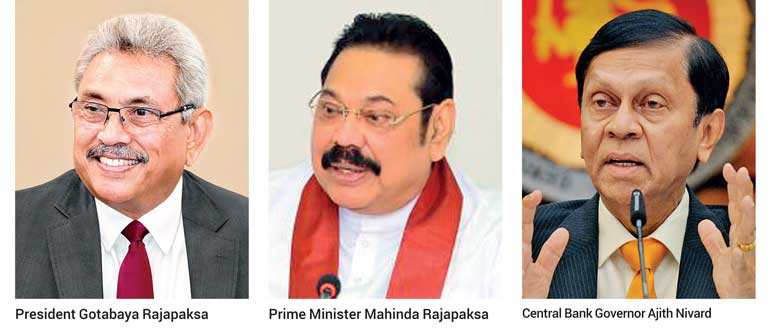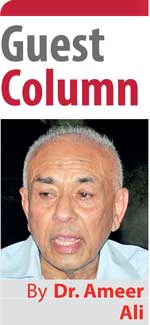Monday Feb 16, 2026
Monday Feb 16, 2026
Tuesday, 15 March 2022 03:47 - - {{hitsCtrl.values.hits}}

IMF in February and UNHRC in March had come out with two sets of recommendations, to enable Sri Lanka to pull out of its economic and socio-political sickness. Both sets are interrelated. The underlying themes of the two, one mostly economic and the other equally non-economic, are not new, and in fact, a number of home-grown economists, intellectuals and leaders of civil society groups had been reminding and warning the Rajapaksa regime of its misplaced priorities, misuse of economic resources and mistaken precepts of governance. 
But, to recall Lord Acton, power corrupts and absolute power corrupts absolutely. Populism and arrogance combined, and in the name of ‘alternative way’ to achieve “prosperity and splendour”, the economic locomotive was derailed, shattering the local production base as well as its consumption associate. Without confronting the reality of the situation and willingness to retract from the dreamy path the regime went on making ad hoc adjustments while scapegoating the pandemic.
But, no amount of scapegoating could hide the fact that it was sheer mishandling of the economy by a regime committed to an ideology of Sinhala Buddhist ultra-nationalism that created the current dystopia. As a result, while the vast majority endure economic and financial misery and deprivation, ethnic-minorities have, in addition, been left disconnected from mainstream development because of Government’s discriminatory policies rooted in ethno-nationalism. Therefore, without remodelling the economy and reconnecting the disconnected, revival for growth and prosperity is going to be difficult.
On the economic front, there is no choice but to go to the IMF. Delaying is extremely costly. Had the rulers gone much earlier without selling false promises and hopes, the cost of reparation would have been far less and smooth. The chief culprit in this cheat had been the Central Bank (CB). Professor Lakshman who resigned in disgust and his successor Cabraal, an accountant turned politician, were handpicked with other members of the monetary board specifically to assist translating GR’s alternate way into action. CB lost its independence and started pandering to GR’s wishes. Money printing went on overdrive, actual inflation was camouflaged, exchange rate was controlled, and debt repayment and servicing was managed by resorting to more borrowing from friendly countries.
With the subjugation of the apex economic institution, GR’s grandiloquent “vistas of prosperity and splendour” provided the coverage for proposing unaffordable and unrealistic projects in Government budgets. For example, Rajapaksa’s Government had gone crazy over the construction of expressways and highways with borrowed funds, and on the assumption that such investment alone would promote economic growth and bring prosperity.
Actually, it should be the other way round. It is the robustness of a growing economy that creates infrastructure bottlenecks, which call for investment to remove those bottlenecks. Today with no money to import fuel, expressways are practically empty of traffic. Would the Government at least allow pedestrians, cyclists and carters to utilise those roads? What a lopsided development strategy!
In search of a homegrown solution Cabraal presented a six-month road map in October 2021 calling it “dynamic” and promised that foreign exchange flows would exceed $ 10 billion by March 2022. Instead, the country’s foreign reserves had fallen below one billion. He is still the number one opponent to seek IMF assistance. Whether the reason for his persistent opposition is personal, professional or in the national interest only time would tell. (One should not forget that he was the architect of the Greek bonds gamble which cost the country $ 200 million during his previous term in CB). In the meantime, the economy is unstoppably spiralling downwards. The delayed free float of the rupee has sent prices skyrocketing. Starvation is knocking at the doors of millions of households.
Even if the regime finally decides to go to the IMF, whether it would be able to clean up corruption and undertake structural reforms is questionable. Because, such measures would shatter the regime’s political foundation. Besides, economic revival and return to a new normalcy would be impossible as long as the country remains divided with nearly 30% of the population kept out of Government’s care. One should remember that GR declared on several occasions that he was elected by the Buddhists and that he would protect Buddhism and govern according to its virtues. The fact that he is a president for all communities somehow or other slipped his mind.
However, with “weaponised Buddhism” and with khaki and saffron troops marching in front, GR’s Buddhist governance is disturbing the ethnic balance in the north and east of the country where Tamils and Muslims are concentrated. His archaeological task force appointed to excavate and safeguard lost Buddhist ruins proved to be a smoke screen for land grabbing in Tamil districts for State-aided Sinhala Buddhist encroachment.
Prime Minister MR also said on a few occasions that no district or province in the country should belong to any particular community, without extending that argument to the country as a whole. Didn’t BBS secretary Gnanasara Thera claim that this country belongs only to Sinhalese? Moreover, the saffron army’s conversion of Hindu temples into Buddhist viharas, erection of Buddha statues stealthily as recently happened in Mullimalai in Addalaichenai, a Muslim enclave in the Eastern Province, and the gradual disappearance of Tamil writing in public sign boards are attempts at changing the ethnic character of this region.
Finally, the One Country One Law task force headed by an ex-prisoner Bhikkhu is nothing but an attempt to homogenise the nation’s cultural heterogeneity. These measures had widened the gulf between the majority and minorities, and are adding to the stock of injustices and human right violations – the main concern of UNHRC. These matters have to be addressed and power must be shared with minorities if economic revival and peace were to return. IMF reforms are only one half of the remedies required and the other half should come from satisfying UNHRC’s demands.
Without any clue about how to tackle the ruling chaos, GR’s moves to convene (a) an all-party conference, (b) appoint a 11-member committee with 10 ministers plus the CB chief, and (c) to meet with TNA are public relation exercises to hoodwink the people and may be to please India. The regime has failed and failed miserably, and there is no reason why it should continue. A change of regime is therefore imperative to recharge the economy, reconnect the people and restart the struggle, at least to reduce the pain and suffering of the masses.
(The writer is a Professor at the School of Business and Governance, Murdoch University, Western Australia.)